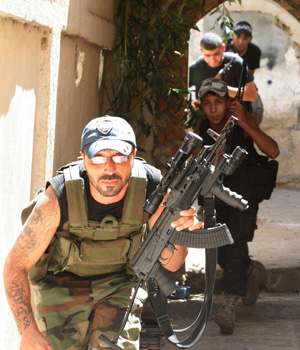
Lebanese Army soldiers deploy in a Sunni-dominated neighborhood of Tripoli, Lebanon Aug. 24 to stop clashes between Sunni Muslims and Alawites. Photo: Reuters
May Mean Changes for Hezbollah
What does the spillover of sectarian violence from Syria to Lebanon mean for Hezbollah? And will it lead to broader instability?
Paul Salem, director of Carnegie Endowment Middle East Center’s office in Beirut, believes violence in Sunni and Alawite neighborhoods of Tripoli will continue but is unlikely to spread elsewhere.
“There don’t seem to be currently the makings of a major escalation by the only side that could probably escalate in a dramatic way, which would be the Sunni majority of the city, which would then risk a massacre or something very dramatic,” Salem said.
“I think it will remain within these limits of escalation, then calming down, escalation and then calming down, for the foreseeable future,” he said. “But it’s certainly one of the indications of the inter-connectedness between the crisis in Syria and the situation in Lebanon.”
Many Sunni Lebanese still resent nearly 30 years of Syrian occupation and openly back the mostly-Sunni rebels fighting Syrian President Bashar al-Assad’s increasingly-Alawite army. Lebanon’s Shi’ites and Alawites generally back Assad and his supporters in Syria.
So it doesn’t take much to ignite similar sectarian tensions in Lebanon. This is especially so following the arrest of former parliamentarian Michel Samaha. He’s accused of supplying explosives to kill a Maronite Christian patriarch in a Sunni neighborhood in hopes of igniting Sunni-vs-Christian violence.
“The situation in Lebanon has become more precarious and the need for continued international support to the government and the Lebanese armed forces increasingly important,” Jeffrey Feltman, the U.N. under secretary-general, told the Security Council. “Tensions over domestic and security concerns remain high through the country and are easily exacerbated by developments in Syria.”
U.S. concerned

Sunni militiamen take up positions in Tripoli, Lebanon Aug. 24 during a lull in fighting with Alawites in the city. Photo: Reuters
The Obama administration says it is closely watching the spillover of violence.
“We are obviously trying to be supportive of the Lebanese armed forces as they try to bring order, and consulting with Lebanese colleagues on the situation. But it is extremely concerning,” said State Department spokeswoman Victoria Nuland.
At Washington’s Cato Institute, Middle East analyst Malou Innocent said continued violence could not only affect Beirut and Damascus, but hurt Hezbollah.
“Since the 2006 war with Israel, Hezbollah has cobbled together a constituency of support that remains fairly strong,” Innocent said, “but it also could be weakened if we see more violence.
“I think we would see an erosion of political support, especially within the largely-Shi’ite constituency of Hezbollah,” she said. “ It simply gives more credence to the notion that Hezbollah cannot create a great deal of stability within Lebanon.”
So far, Hezbollah leaders have worked hard to stay out of the fray, noticeably by not provoking Israel.
At Lebanon’s American University, political scientist Imad Salamey said Hezbollah’s interests diverge increasingly from those of President Assad’s.
“The decline of Syrian hegemony and the decline of the strategic importance of Syria with respect to other international and regional players such as Russia and Iran may be subsidized by a growing importance of parties like Hezbollah,” Salamey told VOA’s Margaret Besheer. “So Hezbollah wants to preserve that, [it] doesn’t want to be dragged into a domestic conflict and does not want necessarily to follow suit with whatever the Syrians command it to do.”
Salamey says the longer the war in Syria continues “the more extremists will be attracted, the more sectarian orientation this conflict will take on, and, therefore, it will become easier to be expanded and to spill over to other countries.”

